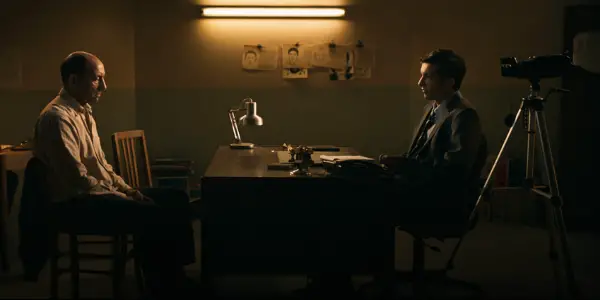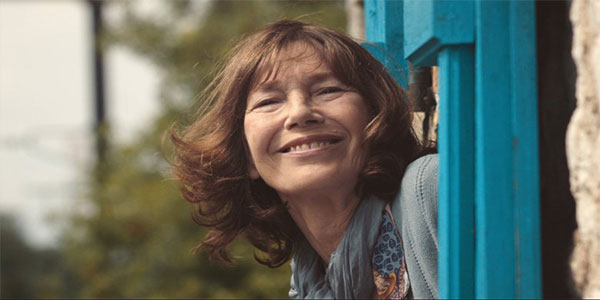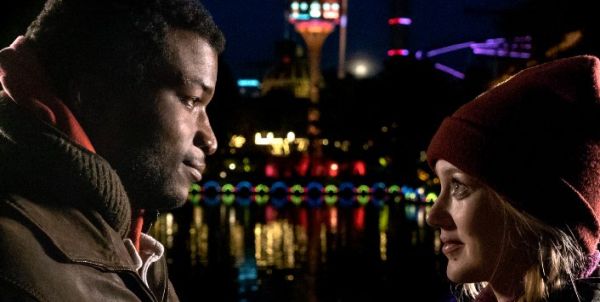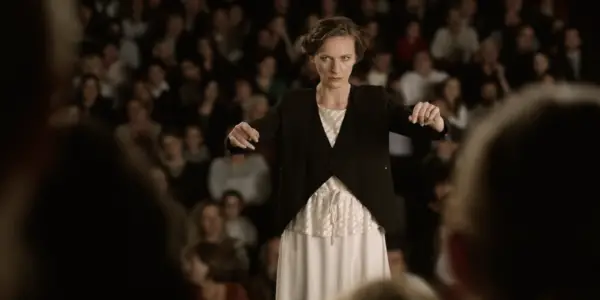Harsh Truths & Touching Tales: 2017’s Oscar Nominated Live Action Short Films

Akemi is a recent graduate of NYU's Tisch School of…
Though short films have been a category for many years in the Oscars, they are never the must-see films in your screening season. When we put together our ballots, more often than not the votes for shorts are just a shot in the dark. Understandably it is not easy to get your hands on a copy of shorts to watch them, but small theaters often show them all together and I urge you to check them out. But if you don’t have the means to see them, here is a brief summary of them all.
Ennemis Intérieurs

Ennemis Intérieurs is set in 1990s France. An Algerian man who has lived in France his entire life is now a middle-aged man seeking citizenship. In explaining himself he mentions that he had once attended service at a mosque. The interviewer becomes fixated on this fact, grilling for more and more details, digging for any traces of suspicious information. When asked to give names of members of the mosque and people in his neighborhood, he refuses.
The interviewer threats deportation on the account that any meetings he had with his community could be terrorist activity. Despite his explanation of the meetings as friendly gatherings meant to catch up and share a meal, the interviewer is only interested obtaining names. The interviewer asks the man if he is French or not, handing him a French passport as a bribe to make him give names.
The gatherings are shown in flashbacks, portrayed in saturated warm colors, with light pouring into the room. Family men, in casual attire sitting in a circle on the ground laughing and sharing a meal. You can feel the happiness and the brotherhood in the room, however, you cannot hear what they are saying, leaving it ambiguous as to whether or not these meetings were more than weekly fellowship gatherings. The challenge of deciding whether or not there could have been suspicious activity in the meetings is more than that question alone, but a self-reflecting moment for you to ask yourself what would you believe.
Is your allegiance to a nation so important that you would blindly point your finger to a friend? Selim Azzazi hits a poignantly relevant note in our current state of affairs to ask this question. Each of the two men in the film represents more than just themselves, they represent the two sides of the discussion. Hassam Ghancy exhibits the desperation and simultaneous strength of immigrants that are pushing to gain access to the privilege of citizenship and Najib Oudghiri powerfully and eloquently portrays the countries that thrive off of prejudice. Having a prejudice that is so strong there can only ever be black and white, right or wrong.
In less than thirty minutes, Ennemis Intérieurs takes a massive discussion and puts it into this cold, dark interrogation room to summarize everything standing in the way of world peace.
La femme et le TGV

Inspired by true events, La femme et le TGV is the most heartwarming and unfortunately clichéd of this year’s nominees. Elise an elderly woman that is trying hold onto the past as she lives a mundane life, her only excitement and purpose are to wave to the TGV train as it passes her house every morning and evening. One day a letter from a man named Bruno flies from the train and Elise responds by post. The two become pen pals discussing how they both feel that their lives lack the excitement they desire.
The train is eventually rerouted to shorten its travel time. Elise becomes determined to say goodbye to Bruno wave at the train one last time, racing her bike to its new station. In the process, a local kid with a fast car drives her to the station and makes it just in the knick of time. Having a taste of the exhilaration of fully living life, Elise decides to let go of her stubborn ways and participate in modern society.
Jane Birkin, is lovable and silly, a perfect fit for the whimsical story. It’s enjoyable and it’ll make you smile, but it isn’t anything special. Often in an attempt to keep the elderly on screen and push against the common assumption that they are left to be forgotten in their old age, similar stories like this one are told. Elderly men and women that are set in their age and their ways that they reject technology and try to hold onto their routine though they are slowly deteriorating. Until they find a greater purpose and a younger person to help them, that eventually can convince them to join the present, allowing them to thrive in their old age. It plucks all the right notes but the tune is too overplayed.
Silent Nights

In an obscure meet cute, a Ghanese immigrant, Kwame and a Danish woman, Inger (Malene Beltoft Olsen) find love in a Salvation Army shelter during the Christmas season. Inger has a heart for serving and giving and takes to Kwame who returns her generosity with a sweetness that is first demonstrated when he helps her cook in the kitchen. Their chemistry sparks when a potato rolls off the counter and their eyes meet as they both go to pick it up. They embark on this relationship of teen bliss until the security camera of the shelter catches Kwame stealing money to send back home.
Kwame comes to her apartment and pleads that it was to save his dying grandfather and she accepts this and the two fall more in love and he moves in. Inger soon discovers she’s pregnant but when she’s waiting to tell him, she looks through his phone and realizes that he has a wife and three kids in Ghana and kicks him out. Her heart is broken, but in a Sixteen Candles moment, the owner of the Salvation Army tells her that Kwame really did love her so she can find comfort in that. Inger, despite the deception by Kwame, doesn’t let her heart harden, and gives Kwame money to return to Ghana while she also chooses to keep the baby. The short ends on a bittersweet note, seeing Kwame reuniting with his family but also seeing Inger alone to raise their child.
It’s obvious that the goal of the film was to touch upon immigration and racism. There were expected scenes of him getting harassed by locals and also Inger’s mother being extremely rude when meeting him. Overall its presence in the film was lacking and used more to benefit the plot than to make a statement. The fault of Silent Nights is that it is perfectly structured and it locks the story down to the three act structure instead of telling a compelling story. The overuse of expected romantic drama tropes doesn’t help much either.
Sing

Also, inspired by a true story, Sing is set in 1990s Budapest, Sing follows Zsofi (Dóra Gáspárvalvi) a new girl in school. She easily befriends Liza (Dorka Hais), the most popular girl in their grade and also the best singer in their school’s prestigious choir group. Zsofi is ecstatic about joining the choir and sings with glee in her first rehearsal; their instructor notices this and holds her back after class. Despite her enthusiasm, their teacher encourages her to mime the songs because her voice is not good enough to sing. Broken hearted but afraid of the shame, Zsofi follows her instructions.
In rehearsal, Liza notices and realizes a number of the other students aren’t singing as well. She calls out their instructor Miss Erika (Zśofia Szamosi) pointing out that it is unfair that the other kids can’t sing out loud. But Miss Erika guilts her for what she has done for shaming the students by pointing out that they aren’t singing. She claims that being the best is worth the honor even if it is a lie. In the national championship, the kids take a stand and all mime, embarrassing their teacher off the stage and then singing with more passion than ever before, altogether.
Rather than showing the results of their performance, the short ends just a few lines into the song to prove that winning isn’t everything. Honesty and heart prevail, it’s touching enough to maybe shed a tear if you’re a softie. Both Gáspárvalvi and Hais are naturals in front of the camera and their cuteness makes you fall in love with them. It’s short and sweet, and of the nominees will make you the happiest.
Timecode

Despite being the most original and pleasantly surprising of the selection, Timecode probably won’t take the Oscar. Luna (Laila Ayguadé) and Diego (Nicolas Ricchini) are two security guards living empty and lonely lives. Their few interactions are with one another when they change shifts and the patrons of the parking garage. The manager informs Luna that there is a broken headlight and asks her to check the camera footage at two in the morning. She rewinds the footage and sees her coworker, Diego dancing around the garage, caught up in the moment he accidentally kicks the headlight.
She chooses to protect him, telling the manager she saw nothing. That evening she barely says a word but leaves a broken shard of the headlight with a time code on a Post-It note. The code reveals her directly in front of the camera, mimicking his choreography. A chain of exchanges between the two guards begins, each leaving a Post-It with a timecode for one another until Luna comes to work to find nothing. The short ends with another guard being trained and the manager showing him how the camera works and types in a timecode that shows the two guards together. It leads into a performance across the garage, the two move perfectly in sync. A duet in harmony, though they had never practiced together.
The emptiness of their jobs and the boredom of their world was rendered through a repetition of scenes. Luna is shown changing into her uniform, clocking in, and their brief passing with one another. These repeated scenes are done enough times to create monotony but not too many where it would waste the few minutes the film is. Aside from their performance, there is no music, but the room tone is heavy and lonely.
The strength of the short was its ability to make every moment count to immerse the audience quickly and effectively. You feel trapped in the guard’s monotony that by the end when you see them dance you feel liberated as well. Though it focuses on security cameras the theme of the film is not voyeurism but the opposite. The cameras were always there but no one was watching, what was found in the footage was by chance.
Which film do you think will win the Oscar? Which one is your favorite?
https://www.youtube.com/embed/L2iB8OE8CwQ
Does content like this matter to you?
Become a Member and support film journalism. Unlock access to all of Film Inquiry`s great articles. Join a community of like-minded readers who are passionate about cinema - get access to our private members Network, give back to independent filmmakers, and more.
Akemi is a recent graduate of NYU's Tisch School of the Arts and still cannot write a proper biography. She has a B.A. in Cinema Studies with a minor in Producing and has no idea what she is going to do with that. She loves comedy in all of its forms and wants desperately to be a stand-up comedian but has stage fright and all of her writing is incredibly sad. She hopes to one day to be a film professor because trapping a bunch of people to listen to her talk about movies all day would be a dream come true.












